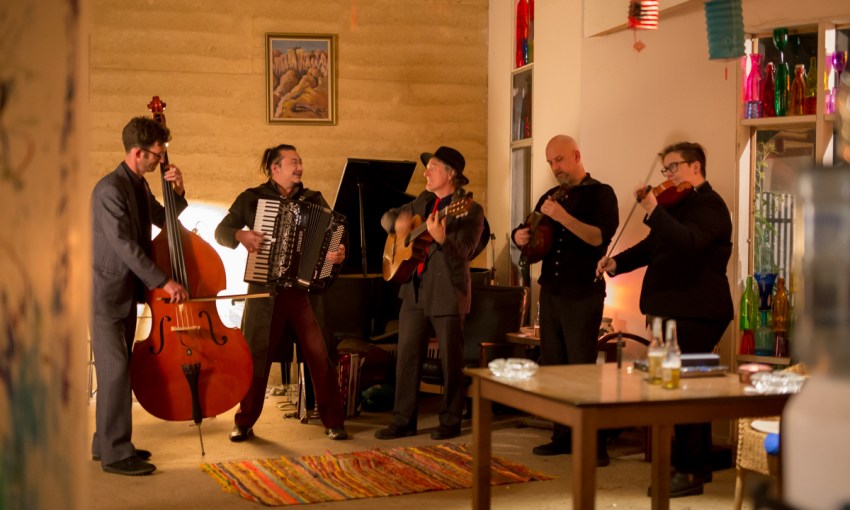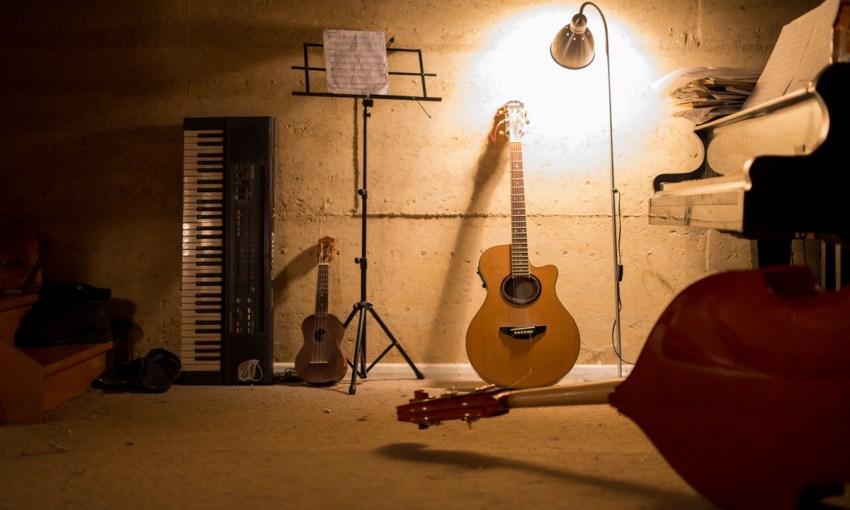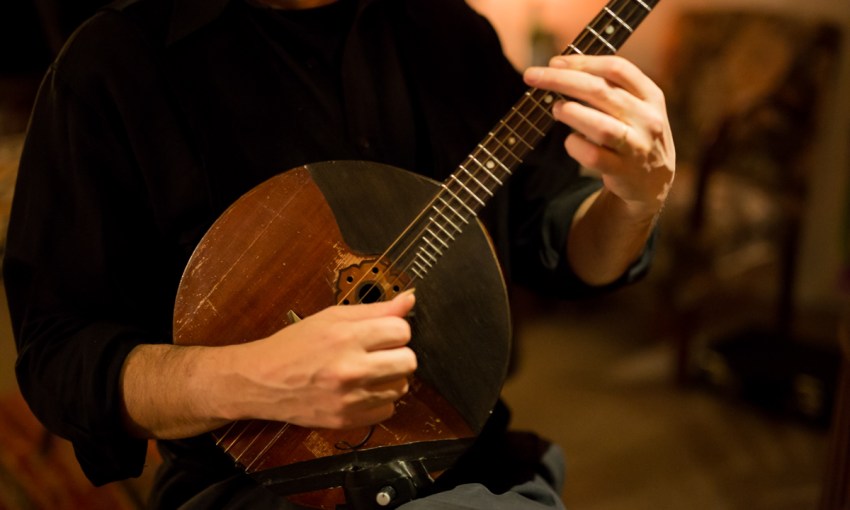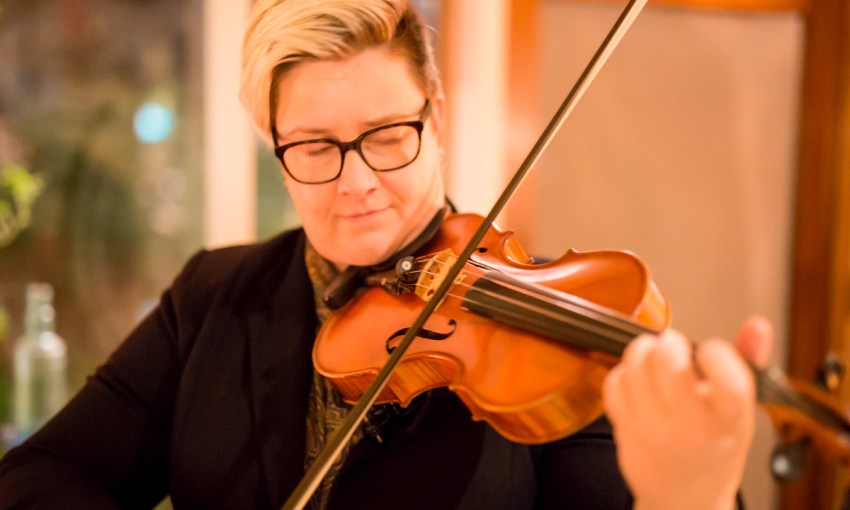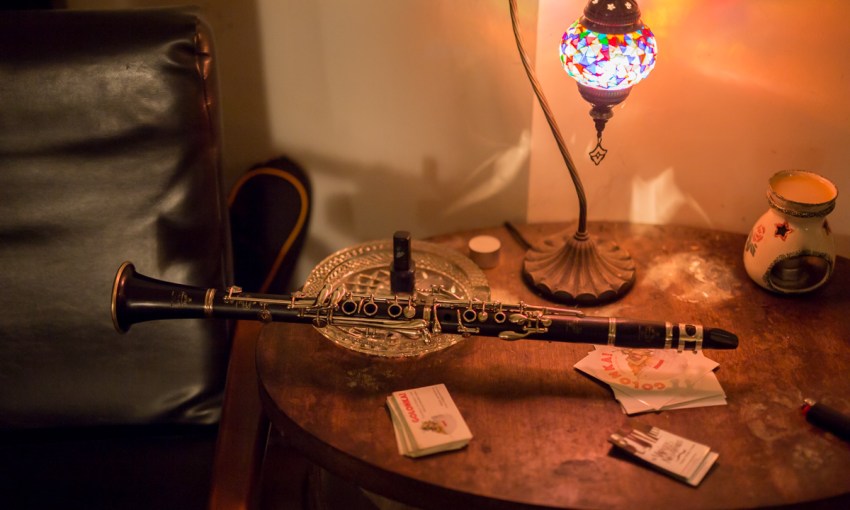From The Wheatsheaf, Thebarton to Hamamatsu, Japan – Golonka is the classically trained gypsy jazz band representing Adelaide on the world stage.
Adelaide to the world with Golonka
“We’re kind of odd-bods on the scene,” Dylan Woolcock says, as CityMag watches he and his quintet, Golonka, set up for rehearsal.
Golonka! at The Wheaty
From 4pm on Sunday, 16 June 2019
You can keep an eye on Golonka’s happenings via their Facebook page. They’re in the process of recording a new album and will resume gigging in the near future.
CityMag is celebrating Adelaide’s status as a UNESCO City of Music with this series on the industry – from front bars to the local talent that’s gone abroad.
Produced in association with the City of Adelaide.
The troupe gathers in the corner of accordion player Gareth Chin’s living room and within moments their very particular brand of Eastern European folk begins to unfurl from their instruments.
The reason we’ve come to meet Golonka is because they were recently flown to Japan to represent Adelaide at Hamamatsu’s annual World Music Festival, but as one off-kilter musical movement stomps into the next, we realise there’s plenty of reason to be spotlighting each musician.
“We’re all trained as classical musicians,” Gareth says.
“We have a unique perspective as a band – Belinda (Gehlert, violin) and Harley (Gray, double bass) play in the Adelaide Symphony Orchestra. Basically, Harley’s full-time in there, but we’ve all had dealings as composers or players with the Orchestra, and then we all do lots of work in theatre as well.
“And then on top of that we freelance… Not a lot of bands would have all their members working in an orchestra, in the theatre industry, string quartets, the folk scene, jazz scene, tango scene, and whatever – I played in a metal band.”
Gareth pins the group’s love of Eastern European music on their classical training.
“It’s generally the music of that region that we grew up learning, and practicing, and forced to study – whatever you call it – it’s all basically European music,” he says.
Adelaide was invited to the Hamamatsu concert due to our title as a UNESCO City of Music. It’s an honour we share with Hamamatsu, the home of Yamaha and Roland; Liverpool, the birthplace of Beatlemania; and Kingston, once home to Bob Marley.
Our place on that list, according to each of Golonka’s members, is well earned.
“Everyone works their arses off,” Belinda says.
“All of us, we’re all freelance… [and] we’re all working five different things at once to make a living as artists, because that’s what we’ve chosen to do, and to be able to do that in Adelaide, I think we’re all really lucky…. But it does mean that you have to work your arse off and you have to be good at what you do.
“It’s a close-knit community as well, because Adelaide is so small, everyone knows each other, really, within the music scene, so it’s pretty easy to go ‘Hey, do you want to do this thing?’ and grab people from different bands.”
“It’s a good place to work, it’s a good community to live in, to be able to work and play music in that way, it’s much tougher in the big cities, or even cities of the same size without much of a scene. It’s a very arty city,” clarinettist Quincy Grant says.
“That’s why it deserves that title [of UNESCO City of Music],” Dylan continues.
“You’ve got all these different scenes happening. There’s a really good young jazz scene happening at the moment, which I think people are starting to become aware of.”
“I think the Adelaide arts scene just punches above its weight,” Gareth says.
“You just get these amazing theatre groups, an orchestra comparable to Melbourne and Sydney, just from nothing – no resources. We certainly don’t get the same money going through even Perth or Brisbane.”
It’s the group’s hope that, with the UNESCO badge of approval, more credence will be given to the notion of Adelaide’s music and arts scene being world-class, and it can continue to thrive, perhaps with more resources (or at least fewer cuts).
“There’s definitely some hope, I’d say, with the City of Music thing,” Quincy says.
“It is a bit of a gong and it sounds significant – it is significant. You’d really hope that people who are in positions of being able to plan our city’s future would then take that on board in some way.”
Maybe they won’t though, and maybe all that will eventuate from our place in the UNESCO Creative Cities Network is a connection to a global arts community.
If that is the case, then at least we can say there are no musicians better prepared to make the most of that network than ones raised in Adelaide.
“In the spirit of punching above its weight, it would take a lot to drag the Adelaide scene down,” Gareth says.



